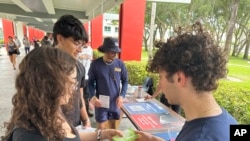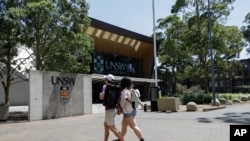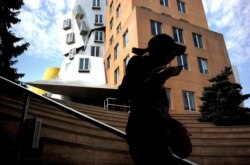Student Union
When College Students Turn to Sugar Daddies for Financial Aid

Liv first met Bill in 2016 when she was a college student and $5,000 in debt from student loans.
Making rent was next to impossible, she said, but Bill helped her manage her expenses and finances better. They saw each other a few times a week, and soon Bill was paying Liv’s tuition and rent. He sent her on exotic trips to Europe and Thailand. They moved in together.
“He taught me how to do my taxes. He taught me how to get my own car insurance. He helped me pay back student loans,” Liv said. “He just taught me so much and he didn’t have to do any of it.
“I actually grew real feelings for him.”
“Actually” because Liv was 24 and Bill was 70 when they connected on SeekingArrangement, an online sugar-dating site that promotes itself as offering “upfront and honest arrangements with someone who will cater to your needs.”
Typically, the arrangements are between young women (sugar babies) and older men (sugar daddies) with money. Sugar babies seek financial assistance in return for company. Most of the sources VOA Student Union interviewed said financial arrangements often, but not always, include sex in return.
“Join the more than 2.7 million students in the United States who have turned to SeekingArrangement and Sugar Daddies to avoid student debt and secure a better future,” according to their website. VOA Student Union made several attempts for comment from SeekingArrangement.
Liv said she was seeking financial support for student debt and other expenses, and Bill was happy to help.
“On that second date, he gave me $2,000...which paid for about four or five months of campus housing,” she said.
Bill loved to treat Liv, she said, and sent her on international vacations. When they had been dating for nine months, Bill sent Liv on a vacation to Thailand. While there, she got a call that Bill had cancer that had metastasized. After she flew home, she slept by his hospital bedside almost every night. A month later, he died.
Bill bequeathed Liv more than $60,000 in an investment fund.
“The money is definitely a big help for me. It helped me move out of the state, helped me get my own place, helped me get a new car,” she said.
Exchanging companionship for financial support is not novel, but the internet has allowed people to connect more easily. That, combined with record-high tuition debt for many students -- $37,000 on average or $1.6 trillion combined nationwide -- has some students looking for alternative methods of debt relief. Some, like Liv, become sugar babies.
She’s not alone. At Georgia State University in Atlanta -- which registered the most sugar babies of all U.S. colleges, according to SeekingArrangement -- more than 1,300 students signed up in 2018. Hundreds of students have signed up at schools in Florida, Alabama, New Jersey, California, Texas and Missouri.
Is it all about sex?
Some women, like Liv, are well compensated in a mutual relationship.
“Sometimes it’s not about sex,” Samantha, a college senior, explained. “Some men are just lonely. Some of them really are looking for someone to hang out with.”
But for others like Helene, the sugar daddies were domineering and violent.
“It’s very rare for sugar babies to find a man that is not looking for sex,” Helene said. When one partner pays for everything, many men feel they are entitled to dominate the relationship.
“I knew that the only way for me to make money was to either sell drugs or get a sugar daddy,” she said.
A 20-year-old international student in the United States, her visa does not allow her to work in the U.S. She says she doesn’t want to burden her family financially. Through SeekingArrangement, she met a 27-year-old man who at first seemed normal, but then became aggressive.
He asked Helene to do things outside their agreement. He told her he would send her $1,000 immediately to have sex with him.
“I was stupid and scared, so I did what I had to do,” Helene said.
When she asked for payment, he taunted her and refused. As she tried to leave, he “took his T-shirt off, wrapped it around my head and tangled it around my neck. … I really thought he was going to keep me hostage.”
Another man Helene met ignored sexual consent. After three months together, he became forceful and “stopped caring about what I thought was uncomfortable. … He would get rougher and more violent with me as if he liked it when I told him to stop.”
Sugar daddies often expect babies to adopt submissive roles in exchange for the money and gifts they receive.
“Some guys, they give you money and they think they have access to you 24/7, like you can never tell them no,” said Liv, who returned to sugaring after Bill died.
Helene said her experiences “kind of ruined my relationship to sex. … I didn’t like to be touched … or hugged from behind … because of what my sugar daddies did to me.”
Still, she is not ready to abandon sugaring, she said.
“It hasn’t changed my relationship to the sugar baby/sugar daddy world, because I need the money," she said.
Men, too
Men are sugar babies, too. Antonio found his first sugar daddy when he was 18.
“I tried to hang out where I knew men with money hung out, because I had no idea what I was doing,” he said. Like Liv and Helene, he needed money for college. His first sugar daddy paid Antonio’s tuition and gave him money for school books and shopping sprees.
Antonio said he misses the perks of sugar dating.
“I work two jobs now … I want to be able to afford the things I once had. I got accustomed to that lifestyle," he added.
Samantha said she just wanted exciting experiences with a mature partner. “I don’t really have any real need for money. [It’s] not something that interests me.”
She said she preferred the no-strings-attached nature of sugar dating. “[I wanted] something that wouldn't be too normal, something that would be more casual ... something that wouldn’t get boring.”
Social stigma
Many people see sugar dating as a form of prostitution, or sex work, which is defined as a consensual sexual encounter between two or more adults in exchange for payment. The legal status of sex work is debated all over the world. In the United States, public opinion on sex work appears to favor its criminalization.
Sweta Patel, a criminal defense attorney in Washington, D.C., said that while there are similarities between sex work and sugar dating, the difference in a sugar relationship is sex and money may be one part of the relationship, but not all.
Patel makes another distinction between sugar babies and sex workers.
“The sugar-daddy model is two consenting adults, while often in sex work, that is not always the case," she said.
Patel said undercover law enforcement monitors websites like SeekingArrangement for relationships that cross into sex work.
“I’m so naive, so I’ve never thought about that,” Helene said.
Because of sex-trafficking and recently passed legislation to control it, such as the Fight Online Sex Trafficking Act (FOSTA) and Stop Enabling Sex Traffickers Act (SESTA), many apps like SeekingArrangement closely monitor messaging. Last year, the popular online classified site Craigslist stopped offering personal ads because they were being used by sex traffickers.
Free to make choices
Ultimately, say some sugar babies, they are adults engaging in adult relationships on their own terms.
“So many so-called romantic relationships are based on how much money or status or how good looking someone is,” Liv said. “How is that more honest?”
“You give your girlfriends and wives money and pay their bills. The one difference here is the age,” she said. “On the other hand, I would say this lifestyle is not for everyone, and not for everyone to approve of or understand. But it works for us and that’s all that matters.”
Helene says the economics are the last word for her.
“Most people think that sugar babies are too lazy to work and make money or (are) gold-diggers, but that’s not always the case,” Helene said. “If I wasn’t in this situation that I’m in, I would never do this. I don’t like giving my body to strangers I don’t know, but if that’s the way for me to get an income, then that’s what I’ll do.”
See all News Updates of the Day
How to get students to ask for help

Colleges and universities have programs to help students adjust to the challenges of higher education but getting students to ask for help is a problem in itself.
In Inside Higher Ed, Cecilia Santiago-González and Zoe Lance offer tips for creating a culture where asking for help is part of the process. (May 2024)
- By Phil Mercer
Australian, Chinese university chiefs meet in Adelaide

Australian university leaders held talks Wednesday with their Chinese counterparts over the Canberra government’s plans to cut the number of international students. Australia has said the reductions will ease the stress on housing and reduce immigration.
Representatives from the Group of Eight Universities, which represents large research-intensive institutions in Australia, met Wednesday in Adelaide with leaders from the China Education Association for International Exchange.
The Chinese delegation included senior officials from 22 leading research-intensive universities in China.
In a joint statement, the two groups said that “our research and education links not only deliver enormous economic and social benefits for both countries, but also foster enduring people-to-people ties.”
The talks focused on “constructive dialogue focused on challenges and opportunities around university research in a fast-evolving, globalized world.”
One major challenge is Australia’s plans to cap the number of international students it allows into the country to relieve pressure on housing and rental accommodation in the major cities. It is part of a broader effort to reduce immigration.
In 2023, official data showed that 787,000 international students studied in Australia, exceeding levels seen before the COVID-19 pandemic.
However, the tertiary sector says plans to shut out some foreign students would cost the economy billions of dollars.
Vicki Thompson is the chief executive of the Group of Eight Universities. She told the Australian Broadcasting Corp. Wednesday that it is unclear how far international student numbers would be cut.
“At the moment there is a lot of unknowns about what this will actually mean. We are in very good discussions with government, though. They certainly understand the impact that our international education sector has on tourism, on the economy. So, you know, they do not want to bust it either. It is just how can we come to, I guess, a compromise position where, you know, we do not damage one of our most successful export markets,” she said.
Most overseas students in Australia come from China, India, Nepal, the Philippines and Vietnam, according to government data.
Under the government’s plans, colleges and universities would have to provide purpose-built accommodation for international students if they wanted to exceed the caps on numbers.
Specific quotas for foreign students, however, have not yet been made public by the Canberra government.
Australia’s plan to curb the number of students from other countries is expected to be discussed when Chinese Premier Li Qiang meets Australian Prime Minister Anthony Albanese in Canberra next month.
Some shuttered universities appear to reopen on the web

At least nine universities that have closed appeared to be looking for new students on the web, but the schools are neither accredited nor cleared to accept student aid.
In a USA Today investigation, Chris Quintana looks at what might be going on with the imposter websites. (May 2024)
- By Akmal Dawi
Taliban push for normalizing male-only higher education

In coming weeks, tens of thousands of students in Afghanistan are set to sit for university entrance examinations.
Notably absent from the list of candidates will be females.
The upcoming exams are expected to determine the admission of about 70,000 students to public academic and professional institutions this year.
Last week, when officials from the Taliban's Ministry of Higher Education unveiled the specifics of the upcoming exams, they conspicuously omitted any mention of the exclusion of female students from university admissions.
Despite facing widespread domestic and international criticism for their prohibition of women from educational and professional opportunities, the Taliban have persisted in enforcing discriminatory gender policies.
“The exclusion of women from higher education significantly limits the country's economic potential, as half the population is unable to contribute effectively to the workforce,” David Roof, a professor of educational studies at Ball State University, wrote to VOA.
In December 2022, the Taliban suspended nearly 100,000 female students enrolled in both public and private universities across Afghanistan.
With the nation already grappling with some of the most dire female literacy rates globally, Afghanistan has failed to produce any female professionals over the past two years.
According to aid agencies, the absence of female medical professionals, compounded by other restrictions, has contributed to the deaths of thousands of young mothers in Afghanistan.
The United Nations reports that over 2.5 million Afghan school-age girls are deprived of education.
“The interruption in education can result in a generational setback, where entire cohorts of women remain uneducated and unqualified for professional roles,” Roof said.
'Hermit kingdom'
The elusive supreme leader of the Taliban, Hibatullah Akhundzada, purportedly responsible for the ban on women's education and employment, has never publicly clarified his directive.
Initially, when secondary schools were shuttered for girls in March 2022, Taliban officials said the action was "temporary," insisting that the Islamist leadership did not fundamentally oppose women's education.
However, more than two years later, Taliban officials have provided no rationale for the continued absence of girls from classrooms.
“They have normalized gender-apartheid,” said an Afghan women’s rights activist who did not want to be named in this article, fearing the Taliban’s persecution.
“This is a new norm in Afghanistan, however insane and destructive it may look in the rest of the world,” she added.
In January 2022, the U.S. Department of State appointed Rina Amiri as the special envoy for Afghan women, aiming to garner international backing for Afghan women's rights.
Amiri has actively engaged with Muslim leaders, emphasizing the importance of women's rights in Islam, in hopes of influencing Taliban leaders.
Despite these efforts, there has been no indication from Taliban leaders of any intention to abandon their discriminatory policies against women. “There is no indication this will subside,” Amiri told a Congressional hearing in January.
Senior U.S. officials have also warned the Taliban that there will be no normalization in their relations with the international community unless they allow women to return to work and education.
Thus far, the Taliban’s response has been that they value depriving women of basic human rights more than having normal relations with the rest of the world.
Hong Kong can help link students in US, China

Pandemics, climate change and other global challenges require nations and scientists to work together, and student exchanges are a great way to foster that cooperation.
Writing in The South China Morning Post, Brian Y.S. Wong explains that Hong Kong has a crucial role to play in connecting students in the United States and China. (May 2024)








